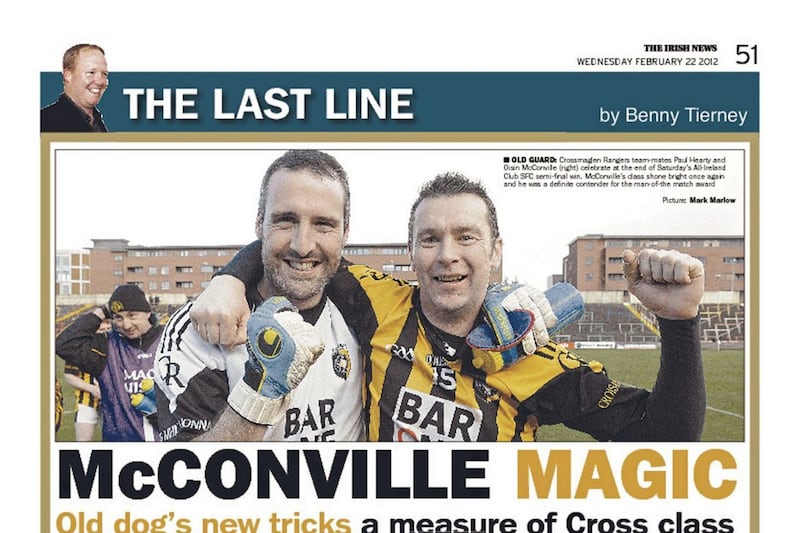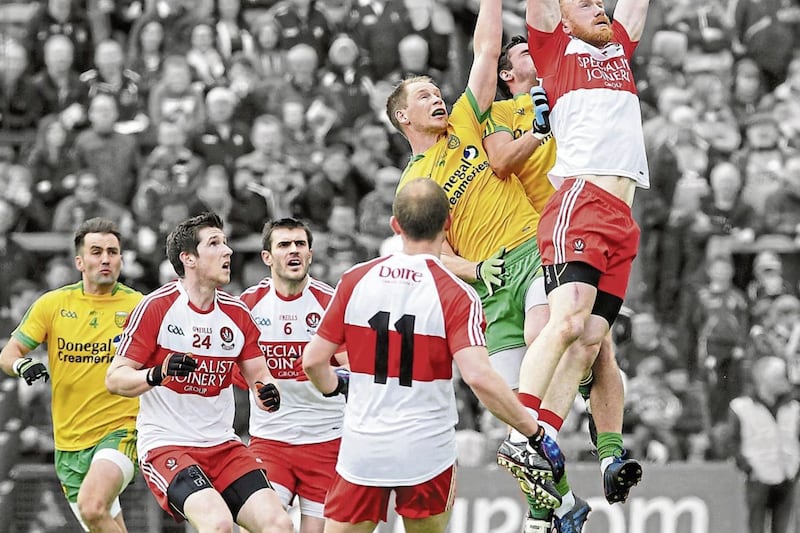I SUPPOSE I heard as many pitches from managers at the start of the season than I care to remember as to what their secret to success was and how the many teams I played for were going to achieve their goals and how hard we were all going to work to get there.
Every new manager sits down and plans in great detail how their season is going to pan out. Everything is looked at including training, gym work, diet, hydration and psychology. All the demands are laid out in a beautiful spreadsheet that is going to guarantee success. Yet I wonder how many of the managers doing this consult the players when they generate that hallowed timetable for the year.
My favourite memory of a meeting with a new manager was when Jim McCorry and John Morrison took over Armagh and we were called to the first gathering in a hotel as the two men set out their plans and stall for the year.
Jim went first. He laid out how things were going to pan out for the new season and then ‘Beefer’ came in with his pitch which was innovative and funny, if not to everyone’s taste, but it grabbed me from the outset.
It was unheard of for managers to have a sense of humour and to be self-deprecating and to talk to players as if they were humans instead of gym monkeys and robots with no opinion.
At the end of his speech, he looked down at all of us and announced that he was going to be as close to us as any surrogate father would be to any child. As far as he was concerned he had just acquired 26 new members to his family and that he would treat us like any father would treat his sons. He finished off by asking us what we thought of that, to which I couldn’t hold it in and shouted over: “Cheers Dad, could you lend me 20 quid as I’m going out tonight.”
I knew straight away that I was going to enjoy my time under this regime. Many will point out that they never achieved anything, yet we got to a National League final from Division Three, beating Dublin by seven points and Laois by eight. Both were two divisions ahead of us which is a situation that I would gladly take now.
Most panels will meet at the start of the campaign and their managers will quite shrewdly have them draw up their own code of conduct which will eventually come back to bite them in the ass later in the year. It’s very easy to say in November that there will be a drink ban all through the Championship as it’s a bit like a few people I know who are always starting the diet next week.
Maybe it’s just me, but my favourite managers were not the disciplinarians or the roarers and shouters, but the men who were able to speak to you as a person. The ones who quietly motivated you to better your input which ultimately led to you looking forward to training rather than dreading it.
St Mary’s University College won their only Sigerson Cup in 1989 and I was fortunate enough to be a part of it. We were managed by Jim McKeever (‘Gentleman Jim’). I have referred to him many times in this column regarding how mild-mannered yet hugely motivational he was in a competition that really belied all his attributes given it was so physical, hard-hitting and intense.
Yet Jim never shouted or roared or got upset or threatened referees or gave prolonged eulogies about his own career - which was so much more pronounced than any of ours.
Yet his positivity and optimistic outlook permeated that panel and steered us towards achieving something that would have been deemed practically impossible for a small college team like ourselves.
I never played under Dessie Ryan yet I get the same feeling from the Armagh boys who played under him at Queen’s that there is a genuine affection between him and anyone who played under him that goes way beyond just football. He brings out the best in them as footballers and, like with Jim, it ultimately leads to success.
Being a leader in the classroom or business world or in sport requires men and women to have a profound empathy for who they are leading and where they want to go. But most of all they have to instil in their charges a willingness to give of their best and make the whole experience as enjoyable as possible.
For me, the enjoyment factor has been lost in the GAA with heightened regimes that require selfless devotion and no time for fun. It’s easy to see how the increased demands on county footballers has directly coincided with a lack of enjoyment from a spectator’s perspective with mediocrity now being the accepted norm in most games witnessed this year.
In the Premiership, with its huge wages and resources, I see only one manager that I would like to play under and that is Jurgen Klopp from Liverpool. You can see he engages with his players and supporters on a human level. He is emotional, but also has a sense of humour and, apart from last Monday night against United, Klopp has Liverpool playing to a style that has long since been a thing of the past at Anfield.
Timetables, spreadsheets, codes of conduct and fitness testing all play their parts in the make-up of a yearly plan towards success. Yet, you must leave time for the most important resource you have - the players - with their most important commodity - time. They will then produce more when given opportunities to enjoy the experience.
Michael Jordan, one of the finest athletes ever to play any sport was quoted as saying “Just play. Have fun. Enjoy the game.” For me, enjoyment and time have become mere by-products, relegated to the back of any template for success.
Yet, any team I was involved with that actually won anything had ample helpings of both.








